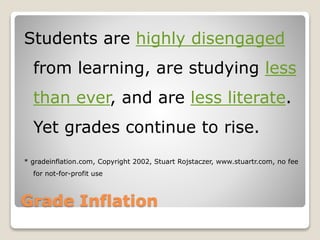Melden
Teilen

Empfohlen
Empfohlen
7 May 2020 - This PPT presents the results of the third OECD PISA assessment of the financial literacy of 15-year-old students. Find out more at http://www.oecd.org/finance/launch-pisa-financial-literacy-results-2018.htmAre students-smart-about-money-oecd-pisa-2018-results

Are students-smart-about-money-oecd-pisa-2018-resultsOECD Directorate for Financial and Enterprise Affairs
Weitere ähnliche Inhalte
Ähnlich wie Grade Inflation Slides
7 May 2020 - This PPT presents the results of the third OECD PISA assessment of the financial literacy of 15-year-old students. Find out more at http://www.oecd.org/finance/launch-pisa-financial-literacy-results-2018.htmAre students-smart-about-money-oecd-pisa-2018-results

Are students-smart-about-money-oecd-pisa-2018-resultsOECD Directorate for Financial and Enterprise Affairs
Ähnlich wie Grade Inflation Slides (15)
Are students-smart-about-money-oecd-pisa-2018-results

Are students-smart-about-money-oecd-pisa-2018-results
Our favorite data points on higher education, enrollment, online strategy, ad...

Our favorite data points on higher education, enrollment, online strategy, ad...
College Can Be Expensive - How Do You Pick the Right One?

College Can Be Expensive - How Do You Pick the Right One?
1Surname1Taiyuan MeiCaitlin KirkleyEnglish 1ASepte.docx

1Surname1Taiyuan MeiCaitlin KirkleyEnglish 1ASepte.docx
ELC Exxon Mobile Case Competition Winner Emory University

ELC Exxon Mobile Case Competition Winner Emory University
Grade Inflation Slides
- 1. Grade Inflation Students are highly disengaged from learning, are studying less than ever, and are less literate. Yet grades continue to rise. * gradeinflation.com, Copyright 2002, Stuart Rojstaczer, www.stuartr.com, no fee for not-for-profit use
- 2. Grade Inflation and How to Use Data to Inform
- 3. Grade Inflation in college WHY? …the resurgence of grade inflation in the 1980s….caused (in part) by the emergence of a consumer-based culture in higher education. Students are paying more for a product every year, and increasingly they want and get the reward of a good grade for their purchase.
- 4. Grade Inflation RESULTING in…. Professors are not only compelled to grade easier, but also to water down course content. Both intellectual rigor and grading standards have weakened. The evidence for this is not merely anecdotal……
- 5. Since the late 1990s, “A” has been the most common grade awarded on four year college campuses. Gradeinflation.com
- 6. Grade Inflation The same type of argument could be made for public high schools – Taxpayers are paying for a product and expecting good results. In addition, high school GPAs are very influential in the highly competitive college admissions process.
- 7. Grade Inflation Nearly twice as many high school students reported earning an A or A- average in 2006 than in 1992 (32.8 percent versus 18.3 percent) (Twenge & Campell, in press).
- 8. CCRPI – Grade accuracy!! To predict how we are performing against the measures of CCRPI, we MUST have accurate formative measures that effectively predict EOCT, SLO, AP and IB performance.
- 9. What is being graded? Mastery of material? Effort? Conduct? Attitude?
- 10. Our expectations of a student are often reflected in to their grade – more than we are willing to admit….. “Whether consciously or not, many teachers incorporate their own expectations of individual students into the grades they award.”
- 11. Grade Inflation A student’s grade should accurately reflect their CONTENT knowledge and understanding based on some measurable assessment – test or performance-based. - not what we think they know - not their behavior - not what they SHOULD know